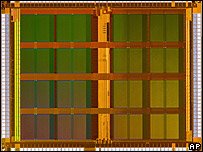The United States Senate has approved a Bill that would allow scientists inside the United States to commence their research on
Stem Cells. President Bush is staunchly opposed to the idea of stem cell research and is expected to veto the bill because he believes the methods that would be employed in the initial stages would be unethical. If he does veto, which he most likely will according to the White House Spokesperson, Tony Snow, it will be President Bush's first veto in both his terms.
The methods involved in the initial stages of the reserach include "therapeutic cloning" and the destruction of a human embryo. The specifics of the controversy are outlined clearly in the following extract from Wikipedia:
"There exists a widespread controversy over stem cell research that emanates from the techniques used in the creation and usage of stem cells. Embryonic stem cell research is particularly controversial because, with the present state of technology, starting a stem cell 'line' human embryo and/or therapeutic cloning. Opponents of the research argue that this practice is a slippery slope to reproductive cloning and tantamount to the instrumentalization of a potential human being. Contrarily, medical researchers in the field argue that it is necessary to pursue embryonic stem cell research because the resultant technologies are expected to have significant medical potential. The ensuing debate has prompted national and international authorities to seek suitable regulatory frameworks and highlighted the fact that stem cell research represents a moral, social and ethical challenge."
My political stance is skewed towards the conservative side, however, in this case, I also understand that the outcome of such research could be staggering and revolutionary. Hence, I believe that as long as the human embryo is given a painless death, and that therapeutic cloning does not lead to reproductive cloning, the research should go ahead. It may seem unethical at first, but at the same time, the outcome of this research may extraordinarily benefit humanity and potentially save thousands, possibly millions of lives. Therefore, in conclusion, allowing the research to go ahead would be the more ethical thing to do. For more information,
click here.




